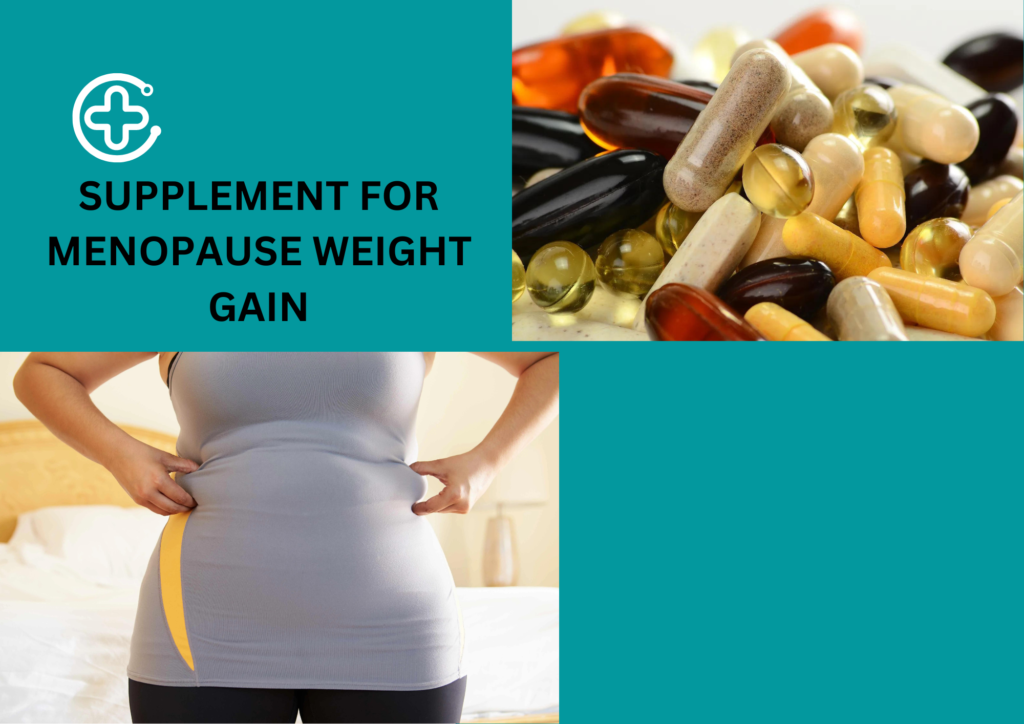The Truth About Supplements for Menopausal Weight Gain
 Menopause. A natural transition, yes, but one that can usher in a wave of unwelcome changes, including the dreaded weight gain, particularly around the belly. This stubborn belly fat isn’t just aesthetically displeasing; it’s linked to an increased risk of serious health problems like heart disease, type 2 diabetes, and even certain cancers. So, it’s understandable that many women turn to supplements as a quick fix to combat this unwelcome visitor. But before you get swept away by the marketing claims, let’s delve deeper and unearth the truth about what supplements can (and can’t) do for menopausal weight gain.
Menopause. A natural transition, yes, but one that can usher in a wave of unwelcome changes, including the dreaded weight gain, particularly around the belly. This stubborn belly fat isn’t just aesthetically displeasing; it’s linked to an increased risk of serious health problems like heart disease, type 2 diabetes, and even certain cancers. So, it’s understandable that many women turn to supplements as a quick fix to combat this unwelcome visitor. But before you get swept away by the marketing claims, let’s delve deeper and unearth the truth about what supplements can (and can’t) do for menopausal weight gain.
Understanding the Menopause-Weight Gain Connection
Menopause marks the end of a woman’s reproductive years, typically occurring between the ages of 45 and 55. As estrogen levels decline during this transition, your body’s metabolism can take a hit, making it easier to pack on pounds and harder to shed them. This isn’t just about burning fewer calories; hormonal shifts can also lead to a redistribution of fat, with a noticeable increase accumulating in the abdominal region. This visceral fat is particularly concerning because it’s more metabolically active than subcutaneous fat (the kind that pinches), meaning it releases harmful substances that can contribute to the health above risks.
The Supplement Scapegoat: Why the Hype Doesn’t Match Reality
The supplement industry is a multi-billion dollar enterprise, and menopause is a prime target. Countless products boast magical abilities to melt away belly fat, supercharge metabolism, or magically block fat absorption—all with a convenient daily dose. However, the reality is far less glamorous. Most weight loss supplements lack robust scientific evidence to back up their claims.
Here’s the not-so-sweet truth: there’s no magic pill for menopausal weight gain. Supplements can’t replace a healthy lifestyle built on a balanced diet and regular exercise. In fact, some supplements can even be harmful, causing side effects that may worsen other menopausal symptoms.
So, What Can Supplements Actually Do?
While supplements might not be the silver bullet you were hoping for, some may offer some benefits, albeit with a hefty dose of managed expectations. Here’s a breakdown of some commonly marketed options:
Green Tea Extract: Green tea contains caffeine, which can provide a slight boost to calorie burning. However, the effect is modest and short-lived.
Conjugated Linoleic Acid (CLA): Research on CLA for weight loss still needs to be conclusive. Some studies show a small benefit on body composition, while others show no significant effect.
Glucomannan: This fiber can promote feelings of fullness (satiety), potentially helping you eat less. However, the long-term effectiveness of weight loss needs further investigation.
Important Considerations Before You Supplement:
Safety First: Always consult your doctor before taking any supplement, especially if you have any underlying health conditions or are taking medications. Some supplements can interact with medications you’re already on, causing unintended consequences.
Regulation Matters: Supplements are more strictly regulated than prescription medications. The quality and effectiveness can vary widely, so buyer beware!
Interaction Alert: Supplements can interact with medications you’re taking, potentially causing adverse effects. Be transparent with your doctor about everything you’re considering, including supplements.
The Real Path to Weight Management During Menopause
While supplements might not be the answer, there are proven strategies to manage your weight during menopause effectively:
Diet is Key:
Focus on a balanced diet rich in fruits, vegetables, whole grains, and lean protein sources.
Limit processed foods, sugary drinks, and unhealthy fats.
Opt for complex carbohydrates over simple ones, as they provide sustained energy and help regulate blood sugar levels.
Exercise is Essential: Aim for at least 150 minutes of moderate-intensity exercise per week. Strength training is particularly important because it helps maintain muscle mass, which plays a crucial role in metabolism. Even small increases in muscle mass can lead to a slight increase in your resting metabolic rate, meaning you burn more calories even at rest.
Stress Less, Manage More: Chronic stress can wreak havoc on your hormones, including those involved in weight regulation. Explore relaxation techniques like yoga, meditation, or deep breathing to combat stress and promote overall well-being.
Prioritize Sleep: Adequate sleep (7-8 hours per night) is crucial for regulating hormones that impact weight management. When sleep-deprived, the body produces more ghrelin (the hunger hormone) and less leptin (the satiety hormone), which makes you crave unhealthy foods and feel less satisfied after meals.
Addressing Specific Concerns
If you’re grappling with menopausal weight gain, it’s crucial to address the root cause for a more targeted approach:
Hormone Replacement Therapy (HRT): For some women, HRT can be a valuable tool in managing weight gain associated with menopause. HRT helps to replace some of the lost estrogens, potentially aiding in regulating metabolism and reducing belly fat accumulation. However, HRT is not a one-size-fits-all solution. It comes with its own set of risks and benefits, so a thorough discussion with your doctor is essential to determine if it’s the right choice for you.
Body Image and Self-Acceptance: Menopause can bring about significant changes to your body. It’s easy to fall into the trap of negative self-talk and focus on what you perceive as flaws. However, embracing a healthy body image is crucial for your overall well-being. Celebrate your strength and resilience. Remember, beauty comes in all shapes and sizes at every stage of life.
Developing a Personalized Plan
There’s no single solution for everyone when it comes to managing menopausal weight gain. The key is to develop a personalized plan that incorporates healthy lifestyle changes you can maintain in the long run. Here’s how to get started:
Consult Your Doctor: Schedule an appointment with your doctor to discuss your weight gain concerns. They can help identify any underlying medical conditions that might be contributing to the issue and rule out any potential thyroid problems or hormonal imbalances. Additionally, your doctor can guide you on a safe and effective weight management plan tailored to your specific needs and health history.
Set Realistic Goals: Don’t aim for overnight transformations. Setting small, achievable goals like losing 1-2 pounds per week is more realistic and sustainable in the long run. Celebrate your victories, no matter how small, to stay motivated.
Find an Exercise Buddy: Exercising with a friend or joining a fitness class can increase accountability and make workouts more enjoyable. Having a support system can significantly improve overall adherence to an exercise program.
Consider a Registered Dietitian: A registered dietitian (RD) can help you create a personalized meal plan that addresses your nutritional needs and preferences during menopause. They can also provide guidance on portion control, healthy food swaps, and managing cravings.
Conclusion: Empowering Yourself for a Healthy Future
Menopausal weight gain is a common challenge, but it doesn’t have to define you. By understanding the science behind it, embracing healthy lifestyle changes, and working with your healthcare team, you can take control of your weight and overall well-being during this transition. Remember, supplements are not a magic fix. Focus on a balanced diet, regular exercise, stress management, and adequate sleep for a sustainable and healthy approach to weight management during menopause. With a little effort and the right support system, you can empower yourself to navigate this phase of life with confidence and feel your best inside and out.
Disclaimer:
The information in this article is for informational purposes only and is not intended to substitute for professional medical advice, diagnosis, or treatment. Always consult with your doctor or other qualified healthcare professional before starting any new supplement or making any changes to your diet, exercise routine, or lifestyle.
Sources:
National Institutes of Health (NIH)
Office on Women’s Health (OWH)
The North American Menopause Society (NAMS)
American Heart Association (AHA)
American Diabetes Association (ADA)
This article references reputable health organizations and government websites to ensure the accuracy and credibility of the information presented.
Table of Contents
SEARCH HERE
CATEGORIES
RECENT POSTS

Best Wig Outlet Exposed: Hidden Costs, Returns & Better Sites (2025)


Advanced Mitochondrial Formula 2025: Can It Truly Recharge Your Energy Levels?

The Truth About Aquaponics 4 You (2025): Does It Actually Work?




Hepato Burn Supplement Review: What You Need to Know Before Buying



“The Ultimate Guide to Papillex: Natural Immune Support for HPV Relief”



Slim Down Naturally: The Truth About Plant-Based Fat Burner That Actually Work

TedsWoodworking Review 2025: Is It Worth It for Your DIY Projects?


This is a crucial subject—keep producing such remarkable content! Someone shared their personal weight loss story, highlighting the difficulties they encountered before discovering the Diet-To-Go Meal Service. They noted that the pre-portioned meals saved them time and supported their commitment to their goals. The conversation is a reminder of how essential balance is to the weight loss journey. For those who may find it useful, here’s the link they provided.
THANKS FOR YOUR FEEDBACK